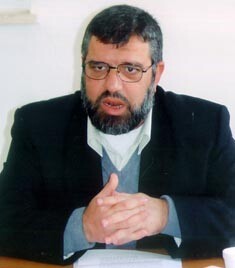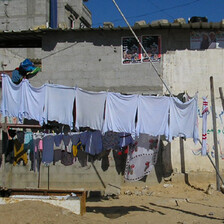Al Jazeera 16 July 2005

“The fact that the assassinations took place a few hours after Palestinian security forces began acting forcefully against the militants is very telling,” said PA official Ghassan Khatib. (PASSIA)

“We are still committed to the ceasefire. We are not interested in any escalation. If Israel continues these acts of extrajudicial executions of our people, we will most certainly defend ourselves,” said Hamas spokesperson Hasan Yousuf. (PASSIA)
The Palestinian Islamic Resistance group, Hamas, says it remains committed to observing the ceasefire, despite the assassination by Israel of at least eight of its resistance cadres. Israeli warplanes on Friday carried out two pinpoint missile attacks on two Palestinian vehicles in the West Bank and Gaza Strip, killing at least eight Hamas resistance activists.
“We are still committed to the ceasefire. We are not interested in any escalation. However, if Israel continues these acts of extrajudicial executions of our people, then we will most certainly defend ourselves,” said Hasan Yousuf, Hamas’s spokesman in the West Bank.
Yousuf accused Israel of waging “state terror” on the Palestinian people in order to appease Jewish settlers opposed to the planned Israeli Prime Minister Ariel Sharon’s withdrawal from the Gaza Strip.
Earlier, Khalid Mashaal, chief of Hamas’s politburo, told an Arab satellite television station that the resistance group was not seeking to end the truce.
Pressure
“Despite this nefarious crime, the Islamic resistance group remains committed to the calm because it serves our national interests.” However, according to some Palestinian observers, Hamas is likely to come under intense pressure from its rank-and-file supporters if the assassinations persist.
“Hamas is likely to absorb this latest hit, but things could get out of hand if Israel kept up the killings,” says Ghazi Hamed. He told Aljazeera.net that Hamas’s reactions to the assassinations would be determined in part by the outcome of the present crisis with the Palestinian Authority.
“If the PA refuses utterly to meet Hamas’s demands, many of which are quite legitimate, Hamas might then find itself in a situation where it has nothing to lose. Then Hamas is likely to act differently.”
Talks
Hamed said the Palestinian factions in Gaza were holding intensive consultations for the purpose of reaching a unified stance on how to face the present situation, especially the mounting tension between Hamas and the Palestinian Authority.
Tensions between Hamas and the PA increased markedly on Friday morning when Hamas fighters and PA security personnel exchanged gunfire for nearly an hour at the Hay al-Zaitun neighbourhood in central Gaza. At least two passersby were killed and others injured.
Hamas leaders in Gaza accused the PA of carrying out Israel’s agenda. The PA said it was obligated to maintain law and order and preserve the national interests of the Palestinian people. The clash was the most serious since PA President Mahmoud Abbas was elected president in January following the death of the late Palestinian leader Yasser Arafat.
Undermining Abbas
The Palestinian Authority strongly condemned the resumption of the assassination policy by Israel as a grave violation of the de-facto ceasefire, reached through Egyptian mediation nearly five months ago.
PA official Ghassan al Khatib pointed out during an interview with Aljazeera.net that the assassinations were “undermining and embarrassing Mahmoud Abbas”.
“The fact that the assassinations took place a few hours after Palestinian security forces began acting forcefully against the militants is very telling. It places the PA leadership in a very embarrassing situation. “The message here is very clear; Sharon is telling the Palestinians that he, not Abbas, is the boss.”
Khatib said he expected Egypt and the United States to step in quickly to prevent the deterioration of the situation in order to guarantee that the planned Israeli withdrawal will be carried out on time.
“The world is viewing this withdrawal as a strategic and paramount development. The world is telling us to be patient and to give this withdrawal the benefit of the doubt. So we are waiting to see if the world will force Israel to carry out the road map.”
Asked if he expected a resumption of violence and bloodshed after the implementation of the withdrawal from Gaza, due to start in mid-August, Khatib said violence would be inevitable if Israel continued to narrow Palestinian horizons and refuse to end the occupation of the West Bank.
Khalid Amayreh is a journalist based in the occupied West Bank. This article was originally published by aljazeera.net and reprinted on EI permission.
Related Links





